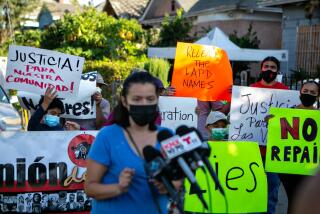Carson Council Allows Continued Sale of ‘Safe and Sane’ Fireworks
- Share via
Bowing to pressure from several civic and charity organizations, the Carson City Council on Tuesday turned aside a local drive to ban the sale of so-called safe and sane fireworks in the city.
However, council members directed a city task force to look into limiting the period for sale of the fireworks. That suggestion was made by fireworks industry representatives, who had feared before the vote that the council might endorse a complete ban, as voters did in an advisory question in November.
Nonprofit charitable organizations, which market the fireworks to raise money, are currently allowed to sell the devices from June 28 to July 6.
Safe and sane fireworks refer to those permitted under state law unless cities or counties ban them. They include sparklers, smoke snakes, cone-shaped fountains that spout multicolored sparks, and party poppers, which emit paper streamers with a satisfying pop.
Many cities in Los Angeles County, including the city of Los Angeles, have banned the sale of safe and sane fireworks. Besides Carson, South Bay cities that do permit such sales are Hawthorne, Inglewood and Lawndale.
Public safety officials and some residents oppose the sales because of the potential for fires. Residents had narrowly supported a ban on the pyrotechnics, 51% to 49%, a difference of 307 votes out of more than 16,000 cast in the advisory ballot.
The council’s 4-1 vote Tuesday was greeted with cheers from an overflow crowd made up largely of members of charitable groups, many of whom carried U.S. flags. More than a dozen speakers had urged the council to disregard the advisory measure.
Pat Krugh, auxiliary chairwoman for the Carson-Wilmington Little League, told the council that the money raised from fireworks sales would help pay for a new Little League division for mentally and physically challenged youths.
“Without these funds, we may have to cut back on the number of teams we have,” Krugh said.
But Ruby Landers, who said she was representing local homeowners, told council members that an injury during a fireworks-related fire several years ago caused her to lose sight in her right eye. Fireworks, she said, have been a continual problem in the city.
“My pets have been terrorized by kids throwing fireworks in my yard,” Landers said. “We have a critical water shortage. We don’t need the extra fire hazard posed by fireworks.”
Councilman Michael Mitoma, who wrote the November ballot argument in favor of the ban, was the only council member to vote against continued sales.
“The people in this city, whether it was 307 votes or one vote, decided that they wanted to ban fireworks,” Mitoma said. “That’s the democratic process.”
After the vote, Mitoma, visibly upset, left the meeting. In comments outside council chambers, he said he hoped he would never see the council place another advisory measure on a ballot.
“Obviously, it has no impact,” Mitoma said, adding that the election was a waste of money for the financially strapped city.
City officials estimate the election cost Carson $24,000, though the city has yet to be billed by Los Angeles County election officials.
Councilwoman Kay Calas agreed the money might have been ill-spent, but she said that was because the vote “was so close.” Calas strongly endorsed the continued sales, saying that for 25 years she has sold fireworks for charitable programs, and the money is put to good use.
If residents are unable to buy legal fireworks, she said, they would probably buy the more dangerous variety.
Last year, the city issued business licenses to 28 nonprofit groups to sell legal fireworks.
Among the proposed regulations concerning fireworks to be considered by the city task force: further limiting the days and hours for sales, raising the age limit for a purchase from 16 to 18, requiring proof of age for a purchase, limiting the total number of stands and the number of stands that any one group and its affiliated organizations can operate, and requiring an organization’s representatives to attend a safety seminar to obtain a permit and license.
More to Read
Sign up for Essential California
The most important California stories and recommendations in your inbox every morning.
You may occasionally receive promotional content from the Los Angeles Times.













